What Does Jasmine Tea Taste Like?
Jasmine tea offers a delicate flavor balance between the fragrant jasmine blossoms and the base tea leaves, with different preparation methods affecting the taste.
Origin and History
Your jasmine tea's roots trace back to China during the Song Dynasty, with a history spanning over 1,000 years. Initially reserved for royalty, this tea is a symbol of hospitality in Chinese culture.
Ingredients and Varieties
Ingredients: The core of jasmine tea lies in high-quality tea leaves, traditionally from green or white teas, scented with jasmine blossoms.
Bestsellers
Varieties: You'll encounter multiple varieties, such as:
- Jasmine Pearl Tea: Rolled leaves that unfurl while steeping.
- Jasmine Silver Needle: Made from white tea for a softer flavor.
- Jasmine Chun Hao: A high-grade green tea with a strong jasmine scent.
Preparation Methods
To fully experience jasmine tea, steep it at 160-180°F for 1 to 3 minutes, adjusting based on your preferred strength. Loose leaf variations may require a tea infuser or strainer, while jasmine tea bags offer convenience.
Flavor Profile
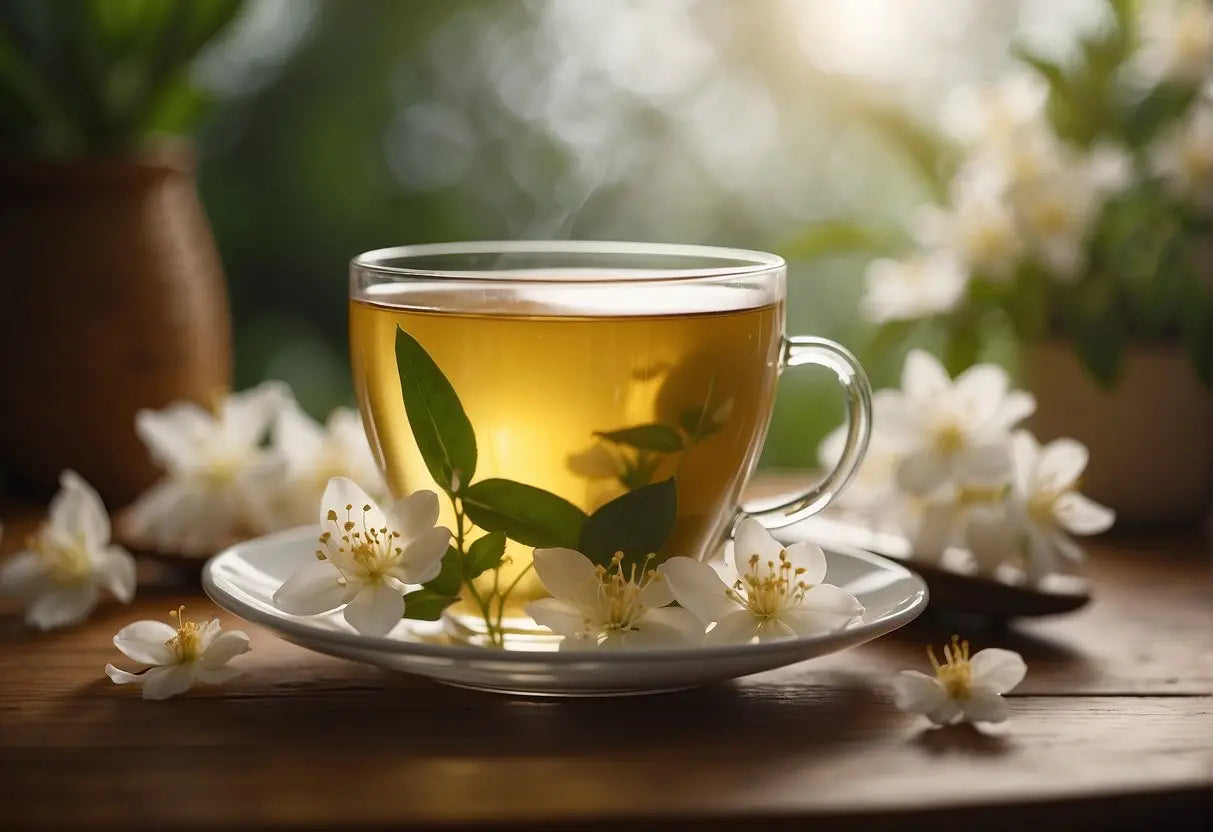
Jasmine tea offers a unique and aromatic flavor experience, shaped by both the quality of tea leaves and the scenting process with jasmine blossoms.
Primary Tasting Notes
- Floral: You'll notice an immediate perfumed fragrance that's both sweet and highly floral, which is the signature scent of jasmine.
- Sweetness: A subtle sweetness underlies the tea, reminiscent of sugar or honey.
Complementary Flavors
- Fruity: Certain blends may have hints of peach or citrus, harmonizing with the jasmine.
- Mint: A fresh undertone that complements the inherent sweetness.
Strength and Bitterness Levels
- Mild to Medium: Most jasmine teas are mild to medium in strength, offering a balanced flavor without overwhelming your palate.
- Low Bitterness: When brewed correctly, the bitterness is minimal, allowing the delicate jasmine flavor to stand out.
Aromatic Characteristics
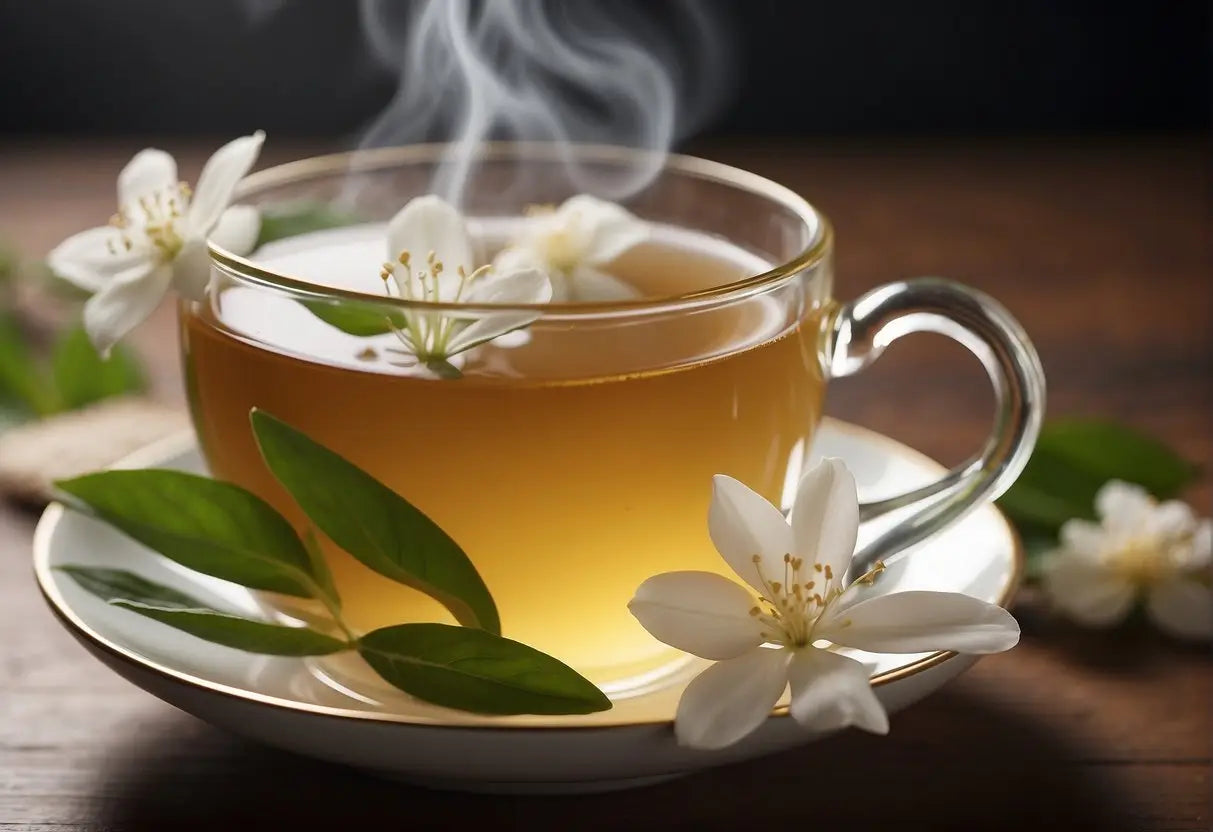
In experiencing jasmine tea, your sense of smell plays a crucial role. The aromatic qualities of jasmine tea greatly influence your perception of its flavor.
Scent Profile
Jasmine tea is noted for its distinctive yet delicate floral scent, primarily derived from jasmine blossoms that are either infused or layered with the tea leaves during processing. The scent profile can be broken down as follows:
- Intensity: Mild to pronounced, depending on the concentration of jasmine flowers used.
- Notes: Sweet and fresh, reminiscent of jasmine flowers in bloom.
- Complexity: Varied with hints of underlying green, white, or black tea notes, influenced by the type of tea leaves used as the base.
Impact of Aroma on Flavor
The aroma of jasmine tea significantly affects your taste experience. When you inhale the fragrance before sipping, it prepares your palate and can enhance the following aspects of the flavor:
- Sweetness: The floral scent may amplify the natural sweetness of the tea.
- Freshness: A lively aromatic profile imparts a sense of crisp, rejuvenating quality.
- Aftertaste: A memorable, lingering scent contributes to a prolonged finish, influencing the length and pleasantness of the aftertaste.
Health Benefits
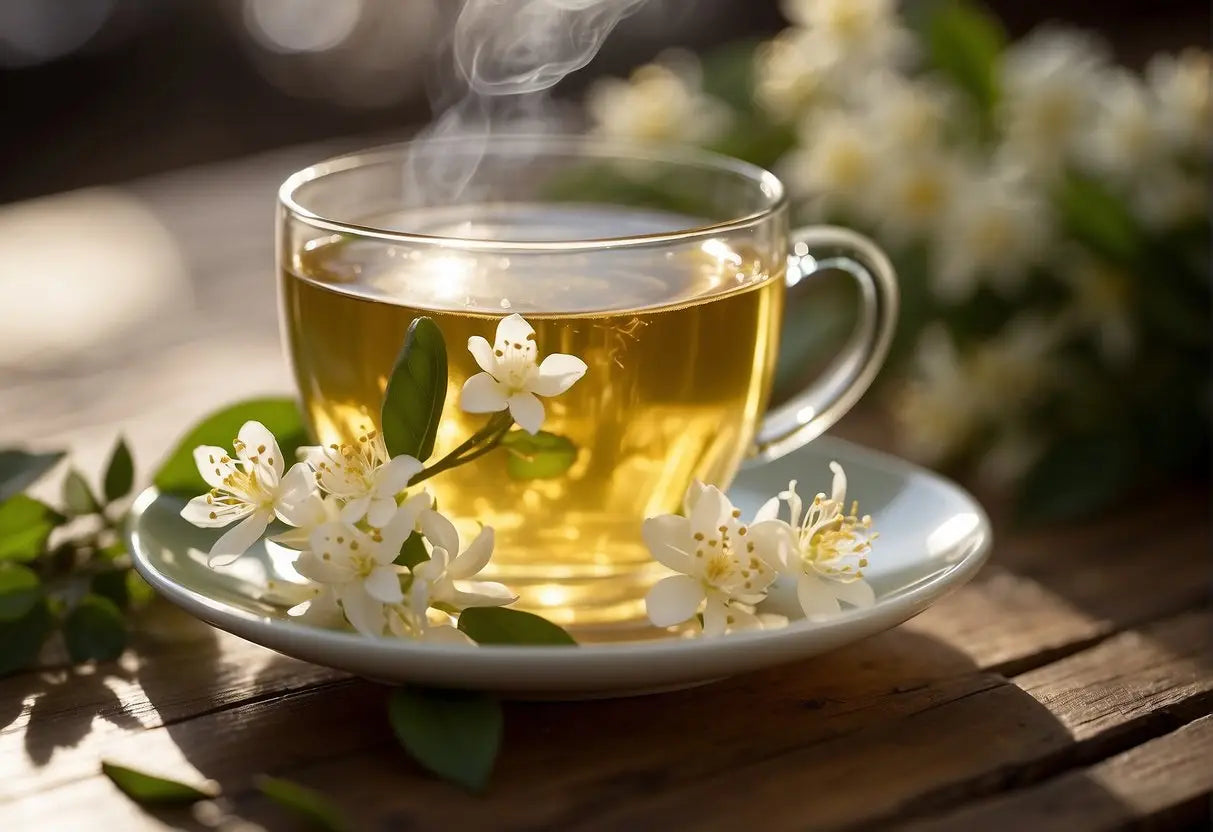
Jasmine tea is not only known for its delicate fragrance but also for its health benefits, which include rich antioxidant properties, stress relief, and digestive health benefits.
Antioxidant Properties
Jasmine tea is laden with antioxidants, particularly catechins found in the green tea leaves often used as its base. Antioxidants help combat oxidative stress in your body by neutralizing free radicals, potentially reducing your risk of chronic illnesses.
Stress Relief and Relaxation
The act of drinking jasmine tea can be a relaxing ritual—its natural aroma has a calming effect that may lower anxiety levels. Compounds in jasmine tea, such as linalool and theanine, promote relaxation and can improve the quality of your sleep.
Lao Ban Zhang
Digestive Health Benefits
Your digestive system may also benefit from jasmine tea. It is known to aid in improving digestion and metabolism due to the presence of polyphenols. Regular consumption can help maintain a healthy gut and alleviate issues such as bloating.
- Polyphenols: Key ingredient known to stimulate digestion.
- Metabolism Boost: Can enhance the body's ability to burn fat.
Brewing Techniques
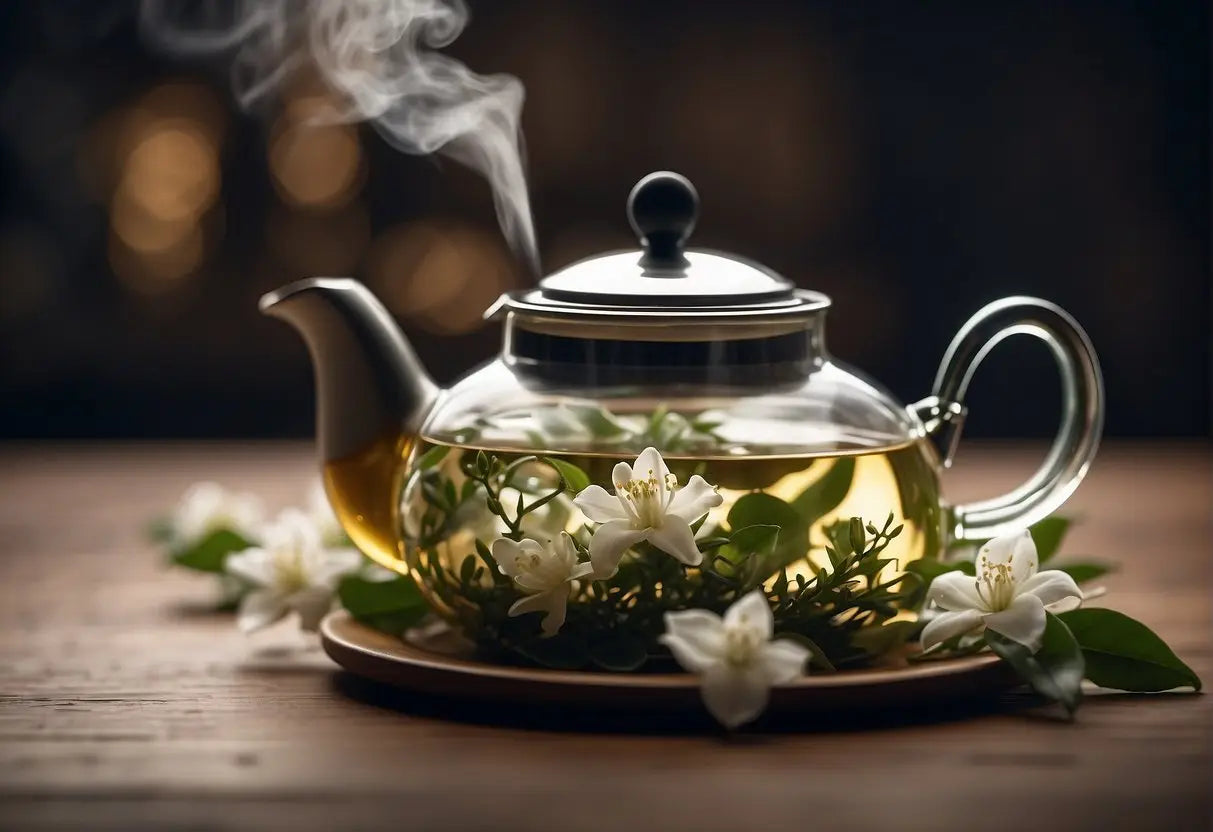
The precision in brewing techniques is crucial to unlocking the delicate flavor of jasmine tea.
Tea Leaf to Water Ratio
For optimal taste, use 1 teaspoon of jasmine tea leaves for every 8 ounces (1 cup) of water. This ratio ensures that the tea is neither too strong nor too weak.
Steeping Time and Temperature
Steep jasmine tea at 175°F to 185°F (79°C to 85°C) for a period of 3 to 4 minutes. Exceeding this time or temperature may result in a bitter taste due to over-extraction.
Culinary Uses
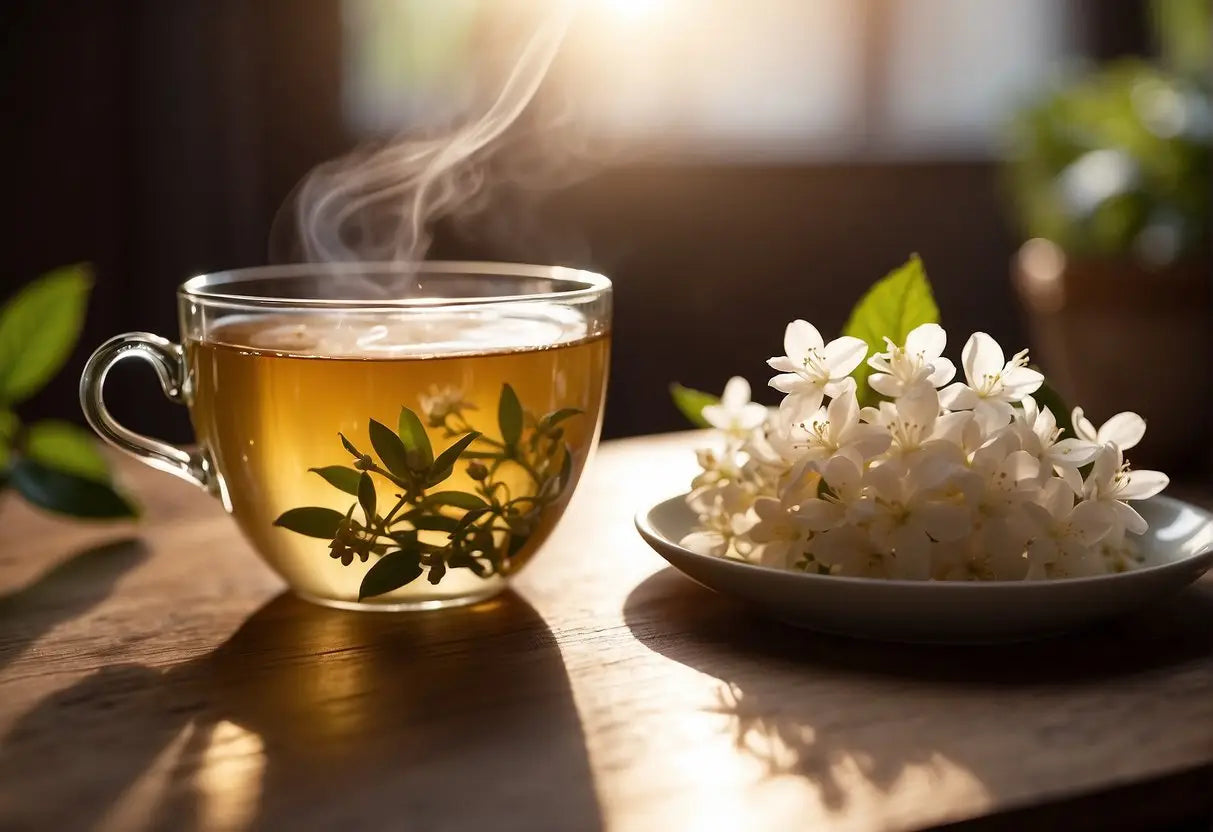
Jasmine tea offers a delicate flavor that complements many culinary applications. Understanding the best ways to pair it with food or incorporate it into recipes will enhance your cooking and dining experiences.
Pairing with Food
Jasmine tea is often enjoyed on its own, but when paired with the right foods, it can elevate a meal. The tea's light and floral notes make it an excellent match for:
- Seafood: Especially dishes with white fish or shellfish.
- Poultry: Lightly seasoned chicken or turkey.
- Vegetarian Dishes: Salads and dishes with green leafy vegetables.
- Desserts: Light pastries, fruit tarts, and mousse.
Jasmine Tea in Recipes
Incorporating jasmine tea into recipes can infuse dishes with its aromatic qualities. You can experiment with:
- Marinades: Use brewed jasmine tea as a base for chicken or fish marinades.
- Rice: Steep jasmine tea leaves with your cooking water to flavor rice or couscous.
- Dressings: Blend strong jasmine tea with oils and vinegars for unique salad dressings.
Cultural Significance
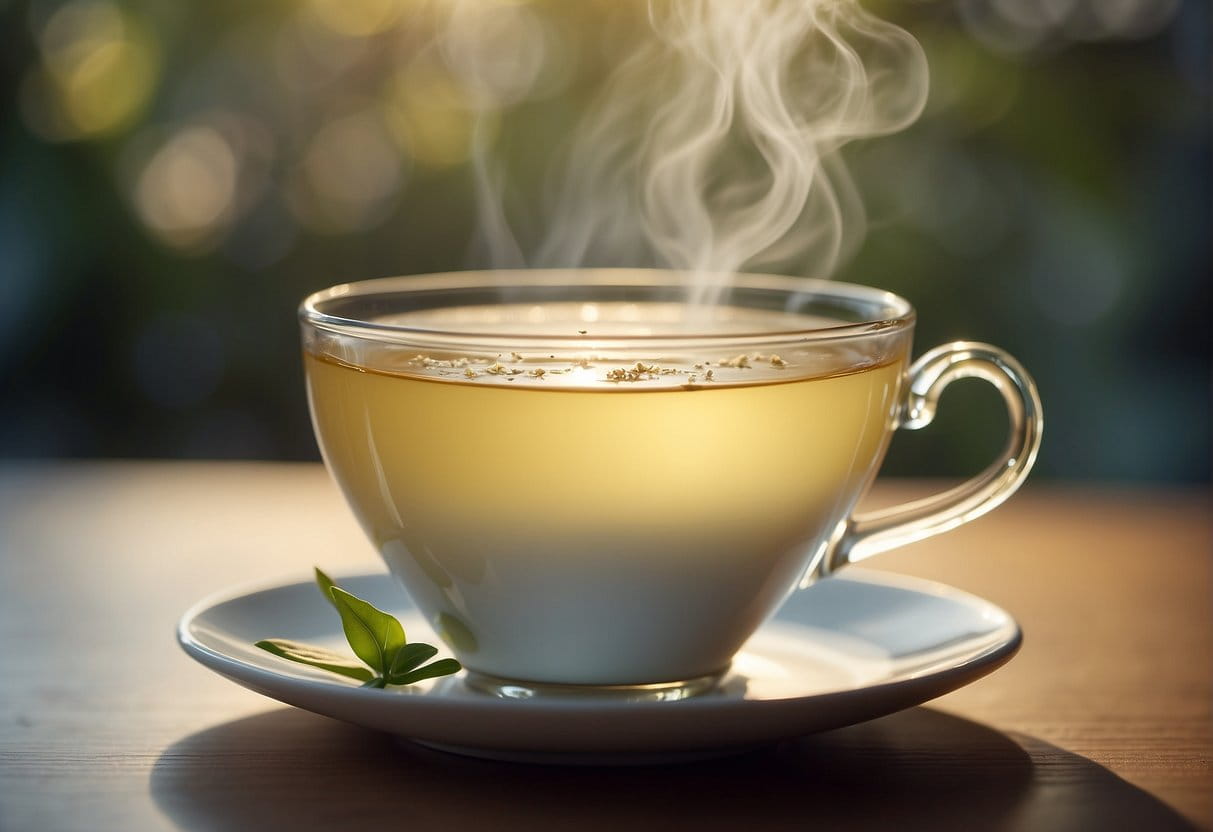
Jasmine tea holds a prominent place in various cultural traditions, particularly noted in tea ceremonies and its global perception.
Tea Ceremonies
You'll find that jasmine tea is an essential part of tea ceremonies, especially in China where it originated during the Song Dynasty. In these ceremonies, jasmine tea is often chosen for its serene scent and is offered as a symbol of hospitality.
- China: The Gongfu tea ceremony accentuates the delicate flavors of jasmine tea.
- Japan: Although not native, jasmine tea is also appreciated for its aroma during Japanese tea ceremonies.
Global Perception
Jasmine tea has garnered international appreciation, viewed as both a gourmet beverage and a cultural ambassador. Its flavor profile has led to its international success.
- East Asia: Revered for its health benefits and intricate scent.
- Western Countries: Embraced by tea enthusiasts for its exotic appeal and antioxidant properties.
Frequently Asked Questions
In this section, you'll find specific information about jasmine tea's flavor profile, comparisons with other teas, and the sensory experience you can expect.
How can one describe the flavor profile of jasmine tea?
Jasmine tea typically has a delicate, sweet flavor with a fragrant floral aroma. Its taste is subtly layered, combining the light grassiness of green tea with the fresh scent of jasmine flowers.
Does jasmine tea contain similar flavor notes to oolong tea?
While both may have floral notes, jasmine tea is usually lighter and sweeter. Oolong can vary from fruity to woody, but it often has a more robust and complex profile compared to the delicate nature of jasmine tea.
What are the primary differences between jasmine green tea and pure jasmine tea?
Jasmine green tea is a blend of green tea leaves scented with jasmine, resulting in a more nuanced flavor with the vegetal notes of green tea. Pure jasmine tea, which is rarer, is made solely from jasmine flowers and offers a more intense floral taste.
Can one expect a jasmine tea to have a floral, perfumey taste?
Yes, jasmine tea is known for its distinctly floral and perfumed aroma, which translates into its taste. However, the intensity varies depending on the quality of leaves and the scenting process.
What discernible effects does drinking jasmine tea have on mood and alertness?
Jasmine tea, like other teas containing caffeine, can increase alertness. Its aromatic qualities are also said to have a soothing effect, potentially enhancing your mood and promoting relaxation.
In what ways does jasmine milk tea's taste differ from traditional jasmine tea?
Jasmine milk tea combines the floral taste of jasmine with the creamy sweetness of milk, which can soften and round out the flavor. It is often sweeter and more dessert-like compared to traditional jasmine tea.
← Older post Newer post →











